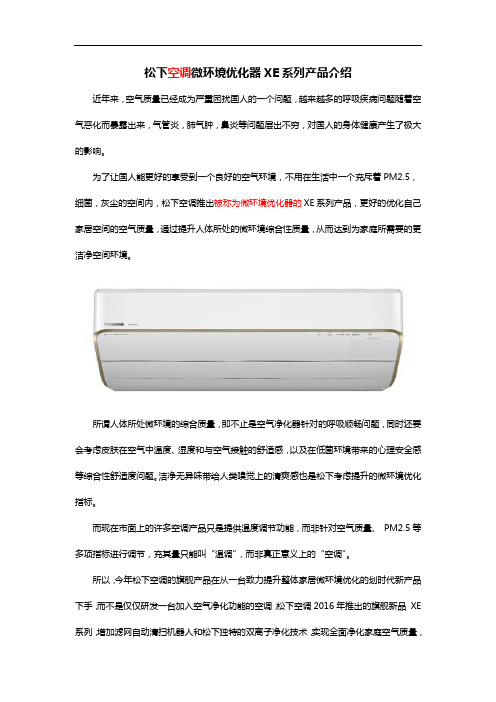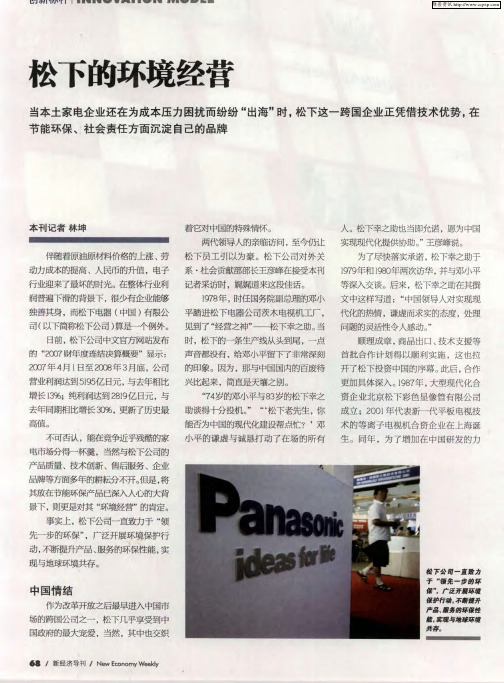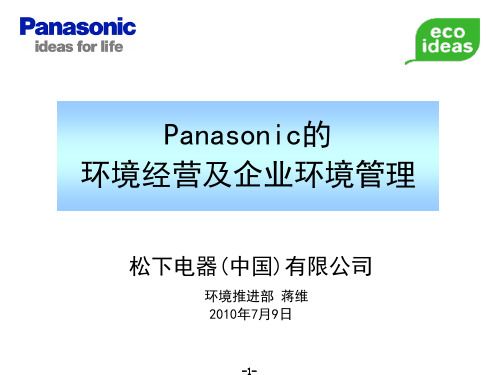松下环境系统 雑志记事
- 格式:pdf
- 大小:158.61 KB
- 文档页数:2

第1篇日本,作为世界家电产业的领军者之一,其家电产品以其高品质和人性化设计而闻名。
然而,在追求卓越品质的同时,日本对于家电行业的法律法规也极为严格。
本文将通过几个典型的日本家电法律案例,分享日本家电行业法规的严谨与细致。
案例一:松下公司产品召回事件2009年,松下公司因涉嫌在冰箱、洗衣机等产品中使用了含有有害物质的多溴联苯(PBDEs)而宣布召回部分产品。
这一事件在日本引起了广泛关注,并最终导致松下公司面临巨额罚款。
案例分析:1. 法律法规的适用:日本《化学物质控制法》规定,生产、进口、销售含有特定有害物质的家电产品均需遵守相关法律法规。
松下公司因未履行审查义务,导致产品中含有有害物质,违反了该法律。
2. 召回程序的执行:在日本,企业一旦发现产品存在安全隐患,必须立即启动召回程序,并向消费者、政府部门通报。
松下公司在事件发生后迅速采取措施,召回问题产品,体现了企业对消费者权益的重视。
3. 责任追究:由于松下公司的违规行为,日本消费者厅对其处以巨额罚款。
这一案例表明,日本政府对于违反家电行业法规的企业将严厉追究责任。
案例二:索尼公司电池爆炸事件2013年,索尼公司生产的部分笔记本电脑电池因存在爆炸风险而引发召回。
此次召回涉及全球范围内的约20万台笔记本电脑。
案例分析:1. 风险评估:在日本,企业需对产品进行严格的风险评估,确保产品安全可靠。
索尼公司在产品上市前未充分评估电池安全性,导致召回事件的发生。
2. 召回效率:索尼公司在发现电池存在问题后,迅速启动召回程序,并向消费者、政府部门通报。
此次召回行动高效有序,体现了企业对消费者权益的重视。
3. 法律责任:由于索尼公司的违规行为,日本消费者厅对其处以罚款。
此外,索尼公司还需承担因召回产生的经济损失。
案例三:东芝公司数据泄露事件2016年,东芝公司承认其内部数据泄露事件,涉及约30万用户的个人信息。
此次事件引发日本社会各界对个人信息保护的广泛关注。
案例分析:1. 个人信息保护法:日本《个人信息保护法》规定,企业需加强对个人信息的保护,防止数据泄露。


The Impact of Japan's Sewage Discharge and Our Responsibility to Protect theEnvironmentIn recent years, the news of Japan's plan to discharge treated sewage into the Pacific Ocean has sparked widespread concern and outcry from environmentalists, neighboring countries, and the international community alike. This decision, if implemented, could potentially have devastating consequences for marine life and the ecological balance of the region.Firstly, it is crucial to understand the gravity of the situation. Sewage, even after treatment, still contains harmful chemicals, bacteria, and viruses that can harm marine organisms. The Pacific Ocean is a vast ecosystemthat supports a diverse range of marine life, including many commercially valuable fish species. The introductionof these harmful substances into the ocean could disrupt the delicate balance of the ecosystem, leading to the death of marine organisms and potentially affecting human health through the consumption of contaminated seafood.Moreover, the impact of this sewage discharge is not limited to the local area. Ocean currents can carry these harmful substances across vast distances, affecting other regions and countries as well. This is a clear example of how one country's actions can have far-reaching consequences for the entire international community.As individuals, we have a responsibility to protect our environment. We cannot sit idly by and allow such irresponsible actions to go unchecked. There are several ways we can contribute to environmental protection, even in the face of such a large-scale issue as Japan's sewage discharge.Firstly, we can raise awareness about the issue.Sharing information and raising awareness among our friends, family, and community can help spread the word and pressure relevant authorities to take action. We can also support organizations that are working to protect the environment and marine life by volunteering, donating, or participating in their campaigns and events.Secondly, we can make informed choices in our daily lives. For example, we can choose to consume seafood fromsustainable and environmentally friendly sources, avoiding products that may have been contaminated by sewage discharge. We can also reduce our carbon footprint by conserving energy, using public transportation or eco-friendly modes of transportation, and reducing waste.In conclusion, the proposed sewage discharge by Japanis a serious threat to the environment and marine life. As individuals, we have a responsibility to take action and contribute to environmental protection. By raising awareness, making informed choices, and supporting organizations that are working to protect the environment, we can make a difference and ensure that our planet remains healthy and sustainable for future generations.**日本排放污水的影响及我们保护环境的责任**近年来,日本计划将处理过的污水排入太平洋的消息引起了环保人士、邻国和国际社会的广泛关注和强烈反对。

松下空调微环境优化器XE系列产品介绍近年来,空气质量已经成为严重困扰国人的一个问题,越来越多的呼吸疾病问题随着空气恶化而暴露出来,气管炎,肺气肿,鼻炎等问题层出不穷,对国人的身体健康产生了极大的影响。
为了让国人能更好的享受到一个良好的空气环境,不用在生活中一个充斥着PM2.5,细菌,灰尘的空间内,松下空调推出被称为微环境优化器的XE系列产品,更好的优化自己家居空间的空气质量,通过提升人体所处的微环境综合性质量,从而达到为家庭所需要的更洁净空间环境。
所谓人体所处微环境的综合质量,即不止是空气净化器针对的呼吸顺畅问题,同时还要会考虑皮肤在空气中温度、湿度和与空气接触的舒适感,以及在低菌环境带来的心理安全感等综合性舒适度问题。
洁净无异味带给人类嗅觉上的清爽感也是松下考虑提升的微环境优化指标。
而现在市面上的许多空调产品只是提供温度调节功能,而非针对空气质量、PM2.5等多项指标进行调节,充其量只能叫“温调”,而非真正意义上的“空调”。
所以,今年松下空调的旗舰产品在从一台致力提升整体家居微环境优化的划时代新产品下手,而不是仅仅研发一台加入空气净化功能的空调,松下空调2016年推出的旗舰新品XE 系列,增加滤网自动清扫机器人和松下独特的双离子净化技术,实现全面净化家庭空气质量,称的上是真正意义上的“空调”。
1)松下空调微环境优化器XE系列功能介绍之外部主动净化松下空调微环境净化器针对家居环境的净化采用双离子净化技术,与被动式净化所不同的是,双离子净化技术通过结露的方式聚集空气中的水分,并通过对其施加高电压生成nanoe-G纳米离子&nanoe纳米水离子。
随空调风扩散到室内的各个角落,通过空气循环,吸附和抑制空气里、沙发、地毯、家具等表面和纤维内部。
nanoe-G纳米离子能吸附空气中的PM2.5和细菌,有效抑制空气中看不见的污染物,创造纳米水准的洁净室内环境。
从而达到净化空气的作用。
其中nanoe-G负责有效抑制PM2.5 99%和去除空中的细菌99%;而nanoe则能渗透到窗帘、家具等纤维深处,进行除菌除臭。


松下电器集团 绿色采购准则(修订版∶第2版)2002年12月1日松下电器产业株式会社序 言敝公司在「环境宣言」和「行动指针」—推进维持、提高环境保护活动,通过开展关心和满足地球、社会、顾客各种要求的事业活动,尽到社会责任—的指导下,编写、提出「绿色采购准则」,作为物资采购活动的一种指针。
今后的要求是,提出「跟地球环境共存」的方案,以架构循环型经济社会为目标,开展生产环保型商品。
因此,今后的企业,重视环境保护的生产是很重要的,而且还必须进一步开展配合善待环境的保护活动。
基于这种背景条件,敝公司在确保生产环保型商品方面,采购减少造成环境负荷的物资当然是必要的和重要的,因此,打算积极配合推进绿色采购。
松下电器集团的物资部门准备按照绿色采购准则的要求,优先开展善待环境的物资采购活动。
最近,社会上越来越关心环境问题,对企业活动的社会责任和伦理性要求也与日俱增起来,因此,修改了部分内容。
特别是,绿色采购没有取得供货厂商的理解就很难实现,对此,敝公司希望跟各家供货厂商携手合作推行绿色采购,敬请支援和协助。
松下电器产业株式会社环境本部长 园田 信雄物资采购本部长 川端 治夫目 次Ι. 松下电器集团的环境保护方案 (1)П. 绿色采购指导方针 (2)Ⅲ. 绿色采购应用手册 (7)1. 关于评价绿色采购的供货厂商 (9)2. 关于评价绿色采购物资(材料) (11)3. 化学物质调查.不使用环境负荷禁用物质报告的处理 (13)Ⅳ. 化学物质管理等级指针(附件)Ι.松下电器集团的环境保护方案环境宪章松下电器集团制定了由「环境宣言」和「行动指针」构成的「松下环境宪章」,旗帜鲜明地表达环境保护的立场。
根据这种基本立场,全球的事业场制定了规则、基准,满足环境保护的要求。
■环境宣言人类付与我们的神圣使命—要跟宇宙万物共存,发展富有协调性的繁荣。
松下电器自觉地肩负起人类付与的使命,承担企业的社会责任,同时,为继续保证地球获得平衡的健康状态而在提高环境保护方面采取细密周到的措施和作出不懈的努力。
曰本排放核污水对我们的生活影响的英语作文How Japan's Nuclear Wastewater Release Could Affect Our LivesMy name is Emily, and I'm a 10-year-old student in 5th grade.I love playing outside with my friends, going to the beach, and eating seafood like shrimp and salmon. Recently, I learned about something that has me very worried about my future and the future of the whole planet.Japan has announced plans to release over 1 million tons of radioactive wastewater from the damaged Fukushima nuclear power plant into the Pacific Ocean. This water has been used to cool down the nuclear reactors that melted down after the big earthquake and tsunami in 2011. The problem is, this water is now contaminated with radioactive materials like tritium, cesium, and strontium.The Japanese government says the water will be treated and diluted so the levels of radioactive materials are safe, and they have gotten approval from organizations like the International Atomic Energy Agency. But many people are still very concerned that releasing so much nuclear waste into the ocean could have serious impacts on marine life and human health.As a kid, this issue worries me a lot because the oceans don't belong to any one country - they are shared by everyone on Earth. If Japan releases this contaminated water, it will spread through currents and contaminate waters far away from Japan's shores. It could build up in the food chain by being absorbed by tiny plankton, then small fish, then bigger fish that humans eat.I love eating seafood like shrimp, crab, and salmon. But if those animals have high levels of radioactive materials in them from the contaminated water, then the seafood I eat could give me radiation exposure. Too much radiation exposure can cause cancers, birth defects, and other scary health problems, even if I can't see or feel the radiation itself.Plus, radioactive materials can concentrate up the food chain, so bigger predators like tuna and sharks could end up with very high levels of contamination that make them unsafe to eat at all. This could devastate ocean ecosystems and fisheries that millions of people depend on for food and their livelihoods around the world.The Pacific Ocean has currents that circulate water all around the globe, so the contamination could spread surprisingly far over time. Perhaps it could even reach waters near where I live one day and pollute beaches where I swim and play. Marineanimals like whales, seals, and sea turtles that migrate long distances across oceans every year could carry contamination with them too.I also worry about the potential effects on babies and young kids, because our bodies are smaller and still developing, which makes us more vulnerable to radiation damage. What if women who eat contaminated seafood during pregnancy expose their unborn babies to radioactive materials that cause health problems or disabilities? That's a really scary thought.Of course, the adults in charge say they have done careful studies and made sure the wastewater release will be safe if done properly. But humans have made mistakes with nuclear plants before, like the accidents at Chernobyl, Three Mile Island, and Fukushima itself. We can never be 100% certain there won't be unforeseen impacts, especially since oceans are so vast and complex.I wish Japan could find some other way to deal with the contaminated wastewater besides dumping it into the ocean that belongs to all of us on planet Earth. Maybe they could keep storing it in special tanks for now and wait for new technologies to remove more of the radioactive materials. In the meantime,they could clean up more contamination at the Fukushima site itself too.If the wastewater release does happen, I really hope the governments and scientists have gotten everything completely right in saying it will be safe. I would feel much better if there was a global team of experts from many different countries involved in double-checking all the safety plans and data. After all, this isn't just Japan's issue - it affects all of humanity.In school, we recently learned about how the nuclear attacks on Hiroshima and Nagasaki caused radiation sickness, birth defects, cancers, and environmental damage that are still being felt generations later. Those events were horrible tragedies, but at least they eventually ended. This wastewater release could potentially cause a new, ongoing source of radioactive contamination in our shared world ocean for many years to come.I don't want the beautiful Pacific Ocean that I love to one day become a scary, radioactive place that harms animals and people.I want to keep enjoying fresh-caught seafood without worrying if it could make me sick. I want to have children of my own someday and not be afraid they could be hurt by radiation exposure before they are even born.The oceans give us so much beauty, food, air to breathe, and other amazing benefits that sustain all life on Earth. We have to be very, very careful about not polluting or damaging them, especially with toxic materials that could harm my generation and generations after us for a long time. I really hope Japan and the rest of the world makes the right choice to protect our irreplaceable oceans.Those are just some of my thoughts as a 10-year-old kid learning about this issue. Maybe the release of nuclear wastewater into the Pacific won't end up being as bad as I fear. But it does make me anxious and sad to think about the possibility of having an important part of my future put at risk before I even get a chance to fully experience and appreciate it. All kids should be able to grow up on a healthy planet with clean air, land, and oceans. I hope the adults in charge make decisions that protect those precious resources for me and for kids everywhere.。
专利名称:Greening system 发明人:荒木 睦,上村 翔申请号:JP2015253565申请日:20151225公开号:JP6052382B1公开日:20161227专利内容由知识产权出版社提供摘要: To provide a greening system having high workability and high water retentivity.SOLUTION: The greening system 1 is a greening system installed on the top surface 10 of the structure, and the first water retentive layer 23 is 100 to 190 kg / m, And the second water retaining layer 24 is formed of a rock wool sheet having a dry density of 30 to 90 kg / m, The ratio of the height of the second water retaining layer 24 to the height of the first water retaining layer 23 is in the range of 0.75 to 2.50 . Such a greening system 1 has high workability and high water retentivity.(FIG.申请人:日東紡績株式会社地址:福島県福島市郷野目字東1番地国籍:JP代理人:長谷川 芳樹,黒木 義樹,清水 義憲更多信息请下载全文后查看。